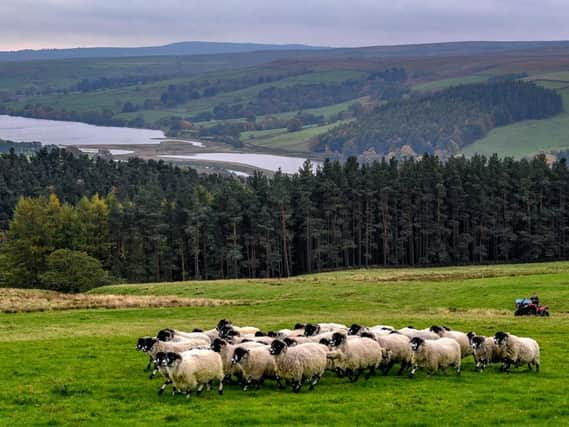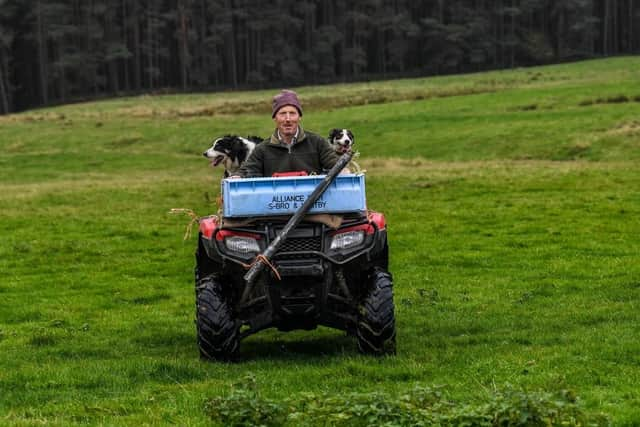Why Dalesbred sheep are synonymous with the Verity family near Pateley Bridge
This article contains affiliate links. We may earn a small commission on items purchased through this article, but that does not affect our editorial judgement.


The Dalesbred breed’s 87th annual shows and sales of draft ewes and rams both took place at Bentham auction mart in the past fortnight with the top price paid being £7,000 to JT and J Kelsall of Clapham for a shearling ram.
Due to the nuances of the breeding world, whereby a judge’s eye can be different to a buyer’s or simply a family’s reputation may come first in the sale ring, the top price went to the reserve champion with the champion shearling making a good deal less.
Advertisement
Hide AdAdvertisement
Hide AdOne family name synonymous with the Dalesbred since the breed broke away from the Swaledale in 1925 is still going strong with a flock of 250 Dalesbred ewes put to the Dalesbred tup and another 500 put to the Teeswater tup to produce the Masham, once the most favoured hill crossbreed until the North of England Mule came along in the 1970s.


David Verity of Grange Farm in the tiny hamlet of Bouthwaite just a quarter mile from Ramsgill and five miles from Pateley Bridge wasn’t at Bentham for the ram sale this year, but his cousin Keith and uncle William were there bidding for the latest additions to their ram team.
“My father Rowland lived for our Dalesbreds producing Masham lambs. We had used Swaledales at one time, which you can to produce the Masham but he eventually shied away from them and moved wholly to Dalesbreds to get the better colour in the Masham’s face.
“When we go to the annual Dalesbred tup sale at Bentham we are generally only looking for one or two to add to what we have already. We don’t buy any ewes as we breed our own replacements and run a hefted flock up on Stean Moor that runs up to 1890 feet. We’re also very fortunate to have hefted sheep gates across what is just over 3000 acres of moorland.”
Advertisement
Hide AdAdvertisement
Hide AdMORE: Stay up to date with all the latest rural affairs news, views and features by joining our new Facebook groupAlthough the Dalesbred Sheep Breeders Association was founded in 1925, the first annual breeders meeting outside of the annual show and sale dates didn’t take place until 1946 and the chairman at the time was SJ Verity with V and F Verity on the committee. David has recently taken on the role of chairman of the Masham Sheep Breeders Association.
“We produce quality Dalesbred, Teeswater and Masham sheep here at Grange Farm and at Stean Farm at the head of the valley below Middlesmoor that we run as a partnership between myself, Keith, William, my auntie Doreen and my mother Rose and trade as J Verity & Sons that utilises my grandmother’s name Jinny. My grandfather died fairly young.
“We also have Swaledales and Blue Faced Leicesters at Stean and in total the ewe flock runs to around 1100. We produce the Mules at Stean and the Mashams at Bouthwaite.
“The Dalesbred has a better conformation than the Swaledale and the Mashams have sold very well this year. We sell all of what we produce and they largely go down to Cornwall, Devon and the south east with some bought to go on the saltmarshes around Morecambe.”
Advertisement
Hide AdAdvertisement
Hide AdMules became the favoured crossbreed over Mashams decades ago but David believes the quality of both the Dalesbred and Teeswater to provide an even better Masham today shouldn’t be ignored.
“Many Masham breeders have told of them faring a lot better during this year’s harsh spring because of their extra wool. Mashams are renowned for their hardiness and live a year or two longer than other hill breeds. Seven or eight shears for a Masham is not unusual.
“That longevity is another major strength in addition to hardiness, milking ability, prolificacy, carcase quality and ultimately when crossed with a Charollais or Charollais X tup produce a tender succulent lean butcher’s lamb.”
Tupping starts this weekend at the Verity’s with the Teeswaters put to the Dalesbreds prior to the Dalesbred tups doing their job in early November.
Advertisement
Hide AdAdvertisement
Hide Ad“Dad line bred the Teeswaters and by doing so and maintaining a close breeding policy we have managed to keep the small flock of 30 pure Teeswaters, bred simply for tups, without buying in fresh blood.
“We start lambing around March 20 to get lambs a bit stronger and better by early September and just about finish lambing down here at Bouthwaite before we start up at Stean.”
The Dalesbred doesn’t command the same prices as the Swaledale whose breeding ewes and tups prices will once again have overshadowed its former fellow breed compatriot but it doesn’t concern David.
“Dalesbred sheep don’t need the same outlay as Swaledales as the main focus is now on producing the North of England Mule that we also produce at Stean, but the Masham produced by the Dalesbred still has an important part to play even though there are less than one hundred breeders left.
Advertisement
Hide AdAdvertisement
Hide Ad“At one time Masham auction mart and Pateley Bridge auction mart were always busy with them and there would be over twenty breeders in this area alone.
“The amount of wool on the Masham was the reason for the Mule’s rise. There was too much of it, but recently this has seen a change in its fortune as Masham wool has become worth far more. I kept one Masham gimmer taking it to becoming a hogg and sold a fleece through a friend to America. It made £50.”
David moved to Grange Farm with his parents and sister Julie in 1974. Forty-four years later and he’s recently married Sarah.
“We married in June this year. I have 19-year-old twins, Ryan who is studying at Northumbria University and Sally who is working at How Stean Gorge Café.
“Sarah has a daughter, Megan, who is 12 years old.”